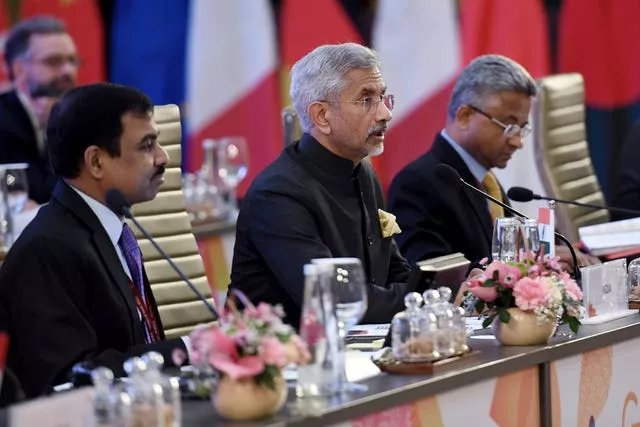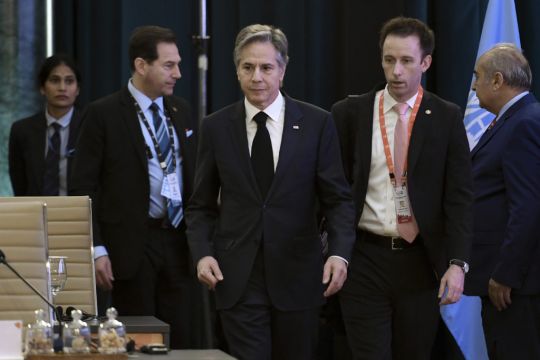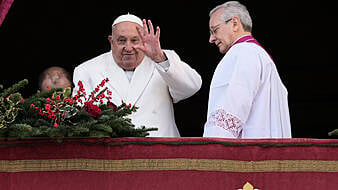Top diplomats from the world’s major industrialised and developing nations on Thursday opened what are expected to be contentious talks dominated by Russia’s war in Ukraine and China’s moves to boost its global influence.
Host India appealed for all members of the fractured Group of 20 to reach consensus on issues of deep concern to poorer countries, even if the broader East-West split over Ukraine cannot be resolved.
In a video address to the assembled foreign ministers in New Delhi, Indian Prime Minister Narendra Modi said multilateralism is “in crisis” and urged them not to allow current tensions to destroy agreements that might be reached on food and energy security, climate change and the debt crisis.

“We are meeting at a time of deep global divisions,” Mr Modi told the group, which included US secretary of state Antony Blinken, Chinese foreign minister Qin Gang and their Russian counterpart Sergey Lavrov, whose discussions would naturally be “affected by the geopolitical tensions of the day”.
“We all have our positions and our perspectives on how these tensions should be resolved,” he said, adding that: “We should not allow issues that we cannot resolve together to come in the way of those we can.”
In a nod to fears that the increasingly bitter rift between the United States and its allies on one side and Russia and China on the other appears likely to widen further, Mr Modi said that “multilateralism is in crisis today”.
He lamented that the two main goals of the post-Second World War international order — preventing conflict and fostering cooperation — were elusive. “The experience of the last two years, financial crisis, pandemic, terrorism and wars clearly shows that global governance has failed in both its mandates,” he said.

Indian foreign minister S Jaishankar then addressed the group in person, telling them that they “must find common ground and provide direction”.
While they were all in the same room, there was no sign that Mr Blinken would sit down with either his Russian or Chinese counterparts. Ahead of the meeting, Mr Blinken said he had no plans to meet with them individually but expected to see them in group settings.
In addition to attending the G20 and seeing Mr Modi and Mr Jaishankar individually on Thursday, Mr Blinken’s official schedule had him meeting only the foreign ministers of Brazil, Indonesia, the Netherlands, Mexico, Nigeria and South Africa.
As at most international events since last year, the split over the war in Ukraine and its impact on global energy and food security will overshadow the proceedings. But as the conflict has dragged on over the past 12 months, the divide has grown and now threatens to become a principal irritant in US-China ties that were already on the rocks for other reasons.

A Chinese peace proposal for Ukraine that has drawn praise from Russia but dismissals from the West has done nothing to improve matters as US officials have repeatedly accused China in recent days of considering the provision of weapons to Russia for use in the war.
Mr Blinken on Wednesday warned China against transferring lethal military equipment to Russia, saying there would be significant consequences for such actions. And, Mr Blinken said the Chinese plan rang hollow given its focus on “sovereignty” compared to its own recent actions.
“China can’t have it both ways,” Mr Blinken told reporters in Tashkent, Uzbekistan, before traveling to New Delhi.
“It can’t be putting itself out as a force for peace in public, while in one way or another, it continues to fuel the flames of this fire that Vladimir Putin started.”
He also said there is “zero evidence” that Mr Putin is genuinely prepared for diplomacy to end the war. “To the contrary, the evidence is all in the other direction,” he said.
The meeting is particularly crucial for India’s hopes to use its chairmanship of the group to leverage its position on the global stage and adopt a neutral stance on Ukraine in order to focus on issues of importance to developing nations like rising inflation, debt stress, health, climate change and food and energy security.







